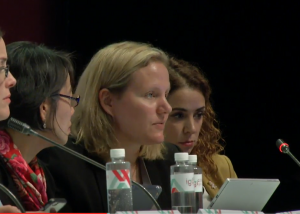Can Bitcoin technology promote equality around the world? Visiting professor speaks in Mexico, Africa
Stetson University Visiting Assistant Professor of Law Carla L. Reyes had the opportunity to speak in Mexico and Africa in December on topics related to cutting-edge technologies like Bitcoin. Professor Reyes participated in discussions about how these technologies can be used to promote economic, social and cultural rights, and how they might reshape the law.
Reyes was asked to speak at the United Nations Internet Governance Forum in Mexico on Dec. 8 and at the Kenya Blockchain Workshop in Nairobi, Kenya, on Dec. 15-16, on how blockchain technologies like Bitcoin can be used to promote equality.
“Blockchain is, at its core, a tool that allows people to organize in a distributed way, and this enables new distributed forms of governance,” said Reyes. “Communities may be able to use this technology to develop less hierarchical, more transparent, and more need-attuned government models that build greater respect for human rights and local cultural values.”
In Mexico, Reyes spoke on how blockchain technologies can advance human and economic rights, led a workshop on governance issues related to the technology, and participated in a panel discussion.
In Kenya, she will participate in a policy roundtable and speak on a panel about the development of law around emerging blockchain technologies.
Professor Reyes’ latest speaking opportunities are a part of her ongoing collaboration with the Coalition of Automated Legal Applications, which serves as the Dynamic Coalition on Blockchain Technologies at the United Nations Internet Governance Forum.
Proponents of Bitcoin like Perianne Boring writing in Forbes assert that “Bitcoin eliminates the need for banking intermediaries, significantly lowering transaction costs and could liberate poverty stricken economies around the globe by providing access to capital to the one-third of humanity that is excluded from the financial world.”
Post date: Dec. 9, 2016
Media contact: Kate Bradshaw
[email protected] | 727-430-1580

